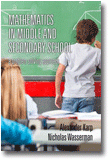
Mathematics in Middle and Secondary School
A Problem Solving Approach
By:
Alexander Karp, Teachers College, Columbia University
Nicholas Wasserman, Teachers College, Columbia University
Published 2014
The experience and knowledge acquired in teacher education courses should build important fundamentals for the future teaching of mathematics. In particular, experience in mathematical problem solving, and in planning lessons devoted to problem solving, is an essential component of teacher preparation. This book develops a problem solving approach and is intended to be a text used in mathematics education courses (or professional development) for pre-service or in-service middle and secondary school teachers. It can be used both in graduate and undergraduate courses, in accordance with the focus of teacher preparation programs.
The content of the book is suited especially for those students who are further along in their mathematics education preparation, as the text is more involved with mathematical ideas and problem solving, and discusses some of the intricate pedagogical considerations that arise in teaching. The text is written not as an introduction to mathematics education (a first course), but rather as a second, or probably, third course. The book deals both with general methodology issues in mathematics education incorporating a problem solving approach (Chapters 1-6) and with more concrete applications within the context of specific topics – algebra, geometry, and discrete mathematics (Chapters 7-13).
The book provides opportunities for teachers to engage in authentic mathematical thinking. The mathematical ideas under consideration build on specific middle and secondary school content while simultaneously pushing the teacher to consider more advanced topics, as well as various connections across mathematical domains. The book strives to preserve the spirit of discussion, and at times even argument, typical of collaborative work on a lesson plan. Based on the accumulated experience of work with future and current teachers, the book assumes that students have some background in lesson planning, and extends their thinking further. Specifically, this book aims to provide a discussion of how a lesson plan is constructed, including the ways in which problems are selected or invented, rather than the compilation of prepared lesson plans. This approach reflects the authors’ view that the process of searching for an answer is often more important than the formal result.
CONTENTS
Foreword. PART I 1 Challenges and Issues in Mathematics Education. 2 Getting Ready to Teach. PART II 3 What is ‘Problem Solving’ and How It is Conceptualized in Mathematics? 4 Integrating Problem Solving into the Curriculum. 5 Mathematical Investigation and How to Engage Students in It. 6 Posing Problems and Groups of Problems. PART III 7 “The Science of Transposition and Cancellation.” 8 Patterns, Functions and Graphs in Mathematics and in School. 9 Patterns, Functions and Graphs: Problem Solving and Lesson Planning. 10 Solving Equations and Inequalities. PART IV 11 Geometry as a Science and a School Subject. 12 Geometry: Problem Solving and Lesson Planning. PART V 13 The Study of Discrete Mathematics. Appendix: Recommended Web Sites. References.
REVIEWS
"Karp and Wasserman's Mathematics in Middle and Secondary School provides an effective framework for exploring the domains of algebra, geometry, and discrete mathematics. The ideas in this book could be deepened with more recent research in problem solving and further exploration in probability and statistics. The first parts provide adequate pedagogical knowledge to better analyze the lesson plans and problem solving ideas presented in subsequent sections. Similarly, the first section of each chapter discusses key ideas, such as aims and objectives, standards, theoretical frameworks, and pedagogical approaches and allows readers to apply these ideas to problem solving and designing lesson plans. These discussions help readers develop a thorough understanding of sound practices in lesson planning and challenges in teaching for, about, and through problem solving." Jonathan D. Bostic & Lance Kruse in Teachers College Record (Read full review)
-
Paperback9781623968120
Web price: $62.04 (Reg. 72.99)
-
Hardcover9781623968137
Web price: $89.24 (Reg. 104.99)
- eBook9781623968144

- EDU000000 - EDUCATION: General
- EDU029010 - EDUCATION: TEACHING METHODS & MATERIALS: Mathematics
- EDU025000 - EDUCATION: Secondary
-
 A Practical Guide to Exemplary Professional Development Schools
A Practical Guide to Exemplary Professional Development Schools
-
 Catalytic Improvement Communities
Cultivating Flourishing Schools
Catalytic Improvement Communities
Cultivating Flourishing Schools
-
 Distance Learning
Volume 20 #4
Distance Learning
Volume 20 #4
-
 Diversity as Strategic Opportunity
Exploring New Paths to Good Administration
Diversity as Strategic Opportunity
Exploring New Paths to Good Administration
-
 Polling Student Voices for School Improvement
A Guide for Educational Leaders - 2nd Edition
Polling Student Voices for School Improvement
A Guide for Educational Leaders - 2nd Edition
-
 The AMTE Handbook of Mathematics Teacher Education
Reflection on Past, Present and Future – Paving the Way for the Future of Mathematics Teacher Education, Volume 5
The AMTE Handbook of Mathematics Teacher Education
Reflection on Past, Present and Future – Paving the Way for the Future of Mathematics Teacher Education, Volume 5
-
 The Undivided Life
Faculty of Color Bringing Our Whole Selves to the Academy
The Undivided Life
Faculty of Color Bringing Our Whole Selves to the Academy

